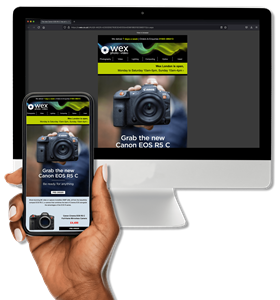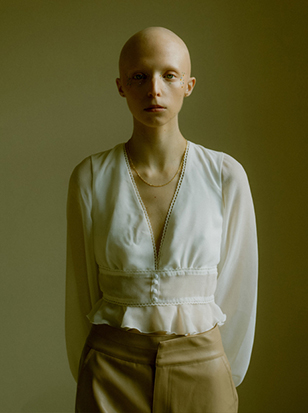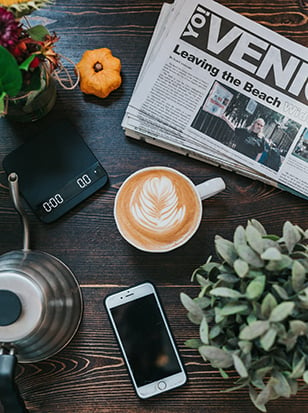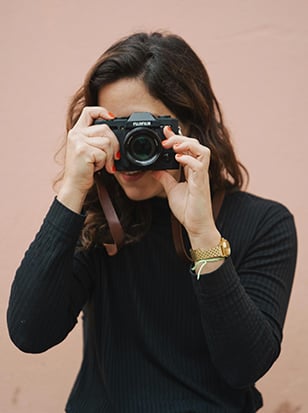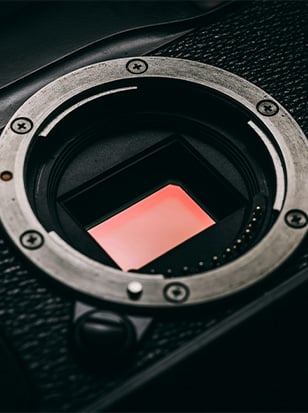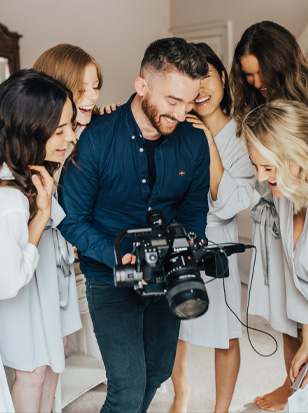
Russell Kent Nicholls
- Job title: Wedding Videographer
- Education: BA Hons in Digital Culture & Computer Science
- Website: russellkentnicholls.com
- Instagram: @russellkentnicholls
- Related jobs: Photographer, content creator, filmmaker, editor, retoucher
The wedding photo album may be a chestnut as old as time itself, but these days more and more marrying couples are looking to capture their day with moving images as well as stills. Wedding videography is big business, and if you’re someone with a knack for shooting video and a cool head under pressure, it could well be an exciting and profitable career to pursue.
Rusell Kent Nicholls is one such shooter, making his living producing cinematic videography of weddings. Based in the South East of England, Russell has only been full-time for a couple of years, but has already established himself as an in-demand wedding videographer. He has a hand in commercial work too, having recently filmed adverts for Panasonic Lumix – he currently uses their Lumix S cameras, as well as DJI drones.
If you think wedding videography might be a career for you, read on as we sit down with Russell to talk about how he got his start in the industry – and learn his top tips for starting out yourself…
Jon Stapley: Thanks for speaking with us, Russell. When you were a kid, what did you want to be when you grew up?
Russell Kent Nicholls: I had no idea. A lot of the other kids at school, their parents were doctors and teachers, and the emphasis was really on science, English and languages. And I didn't enjoy any of those things; I liked art and computer science.
I do remember always having a camera from age 12 or 13. I sacrificed a lot of Christmas presents for a webcam – because it was the cheapest, most accessible camera in the Argos catalogue. I think it was called a ‘Cool Eye Cam’ – it probably had 500 kilobytes of memory and there was no screen, just an LCD which told you how many shots you had left. I remember going on a caravan holiday, and I would burn through 30 shots in one burst, just inside the caravan. I'd be so excited to get home and make them into a little animated video.
View this post on Instagram
JS: When do you think it became more serious – went from something fun you were doing as a kid, to something you were studying in earnest?
RKN: Probably after I went to university. I went to a local university at 19, and didn’t really click with the people on my course. I've always been more of an independent thinker – that's probably why now I tend to do everything by myself. On the business side, I don’t have help with anything, I run the business plan. I very much enjoy being in control, micromanaging myself.
When I left home was when I started buying DSLR cameras – ones that had video functionality, though they weren’t ‘video cameras’. In my early twenties, I did my first ever wedding for my best friend who was getting married. No one had much money back in the day, so I gave that video to her as a wedding present.
Looking back on it – it’s terrible. Though it is a really good reference point for me; if I’m ever feeling like I haven’t grown very much, I look back at that and I think, okay, things have moved on since then.
JS: So was it after that wedding that you started looking for paid gigs?
RKN: I've never really looked for work. I've been quite lucky with word of mouth, and social media has always been a great platform for me. I found that after that first wedding, other people started to ask me if I would do theirs.
I was doing them for free to start with. I didn't feel it was something that I could charge for, because I never had a lot of confidence in what I was delivering. But people started asking me how much I charged, and there was this light-bulb moment that maybe this wasn’t just a hobby; it could be a job. I started doing weddings for people in my local area, at local venues. Things spread from there, and I gradually put my prices up to get to kind of where I am today.
I’ve only been doing this full-time for two years. Prior to that I was juggling filmmaking in my spare time and weekends with a full-time job. I co-owned a health supplement manufacturing business, ran it with my business partner for 14 years. It was doing really well – it still is, I’m just not involved anymore.
While the business got better and better, in my spare time – unknown to my business partner – I was working almost full-time in this secret side-hustle, doing films and getting inquiries for weddings internationally. And I wasn’t sure how I was going to keep making it work, so I had to make a decision.
I considered [that decision] for years and years. I guess confidence was always holding me back. Plus, the idea of going from a regular income to an unknown income is terrifying when you've got a mortgage and bills to pay. My advice for anyone looking to make that jump though is to remember that the time that you're going to have left over from not working your 9-to-5, you’ll be able to reinvest it straight back into your creative business.

JS: Was there a moment after you’d made the leap that you started to feel comfortable it was working?
RKN: Straight away. The great thing about weddings is that most people book you a year or two in advance. So right away I had a financial forecast of what my earnings would be for the year ahead – not including any last-minute inquiries, or commercial work (I do a fair amount of commercial and bridal campaigns between the weddings).
So I had that number on my little spreadsheet, knowing it was the worst-case scenario. From there it’s just a matter of paying yourself regularly. I don’t pay myself very much – I try to keep my business as healthy as I can, in case something were to happen. I guess I'm very sensible and boring in that respect – but my business is my passion and my whole life. It's me, completely.
JS: Have there been challenging moments in your career? Things you’ve had to overcome, or that didn’t quite go your way?
RKN: A huge part of this industry is social media. It’s where I get most of my work and enquiries. And I've always had stage fright – I'm not confident being on camera or talking in front of people, and I think having that confidence, and trying to forget or get around impostor syndrome, is actually quite challenging. Because if you can be confident and present yourself and your brand well, then the opportunities you’ll get are amazing.
I think the other main challenge is client expectation. That connects back to social media; a lot of my clients are finding me from social media platforms like Instagram, and that gives them a certain expectation of what the videos will look like. But ultimately, what I'm capturing is real life, and weddings don't always go to plan! So I try to reassure my clients that whatever happens, I will do my best.
JS: In terms of social media, are you doing most of your marketing on Instagram?
RKN: Instagram and YouTube are my two main platforms. I tried TikTok – I do not do well on that. I think it’s because on TikTok, everyone wants to see unfiltered content – comic and entertaining moments. Whereas I'm focused on putting out quality stuff. So, TikTok is not the right platform for me. And I don't think my clients are on TikTok.
JS: So looking at your actual income, it’s split between weddings and commercial work?
RKN: I'd say probably 60% of my income is through weddings, then the remaining 40% is divided up between different types of commercial work.
With weddings, you have deposits and final balances, so that helps you break up your income over the course of the financial year. The final balance is always really nice to look forward to, because you might not get that for a year or so after actually booking the client.
For the commercial work, it really depends on the client and how much time is going to go into that project. For example I did a Panasonic Lumix advert, and the budget was absolutely massive because I had to take into account things like music licensing, model fees, location fees, travel – there were just so many hidden costs. On the other end, I also do smaller commercial work – my bridal campaigns are just a couple of days’ work on a smaller budget.

JS: What do you think someone beginning as a wedding videographer should look to charge, as a starting point?
RKN: If you're literally just starting out and you want to stop working for free, the next step up from free is probably a few hundred pounds. The other thing to remember is that you're not so experienced just yet – things could go wrong. My thinking when I started was to imagine what people would expect when they've only paid a few hundred pounds, and then try to exceed those expectations.
So I would set it at a few hundred pounds, do a few like that, then put it up by a few hundred pounds, and just keep creeping up until you hit the point you’re comfortable. People say to me that I should put my prices up – I know some out there are charging double what I am. But I don't want to put that much pressure and expectation on myself. I still want to enjoy it, and I'd rather do more work for reasonable money then have everything depend on a handful of really, really expensive high-pressure jobs
JS: Lastly, do you have any final tips for aspiring wedding videographers – anything you wish you’d known when you were starting out?
RKN: There are so many things you don't realise until you've been doing it for a little while. Your connections with wedding photographers are going to be some of your most important, because they're going to be able to recommend work to you, and vice versa. Network with other suppliers, because I think at the start it definitely is a bit about who you know, as well as what you know.
Practice with your camera. Practice having the right settings, and using things like ND filters. Choose a Log [profile] to get the best results out of the cameras that you already have, and that will mean you don't always need to upgrade to the latest gear. I might be shooting with one camera, then a year later I’ll still be shooting with the same camera, but I’ve changed lenses or settings, and things look completely different. Practice, practice, practice. Getting that experience and building that confidence is going to go a long way.
View this post on Instagram
About the Author
Jon Stapley is a London-based freelance writer and journalist who covers photography, art and technology. When not writing about cameras, Jon is a keen photographer who captures the world using his Olympus XA2. His creativity extends to works of fiction and other creative writing, all of which can be found on his website www.jonstapley.com
The Wex Blog
Sign up for our newsletter today!
- Subscribe for exclusive discounts and special offers
- Receive our monthly content roundups
- Get the latest news and know-how from our experts
